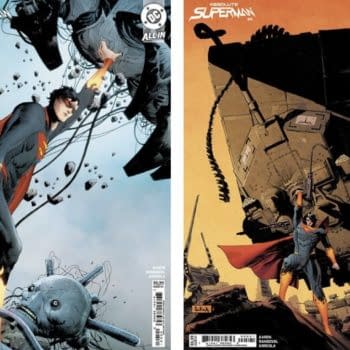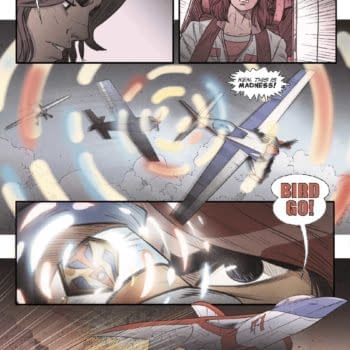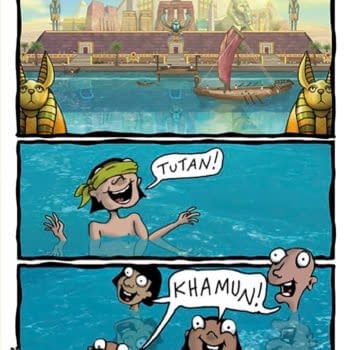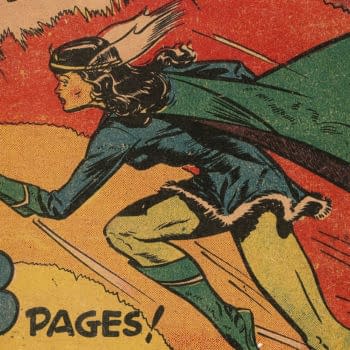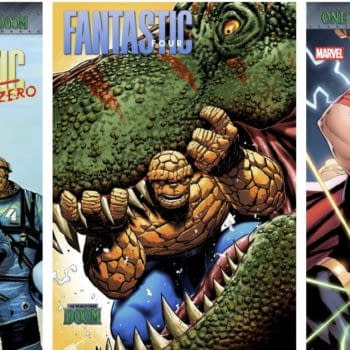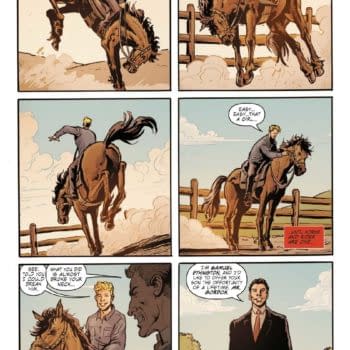Posted in: Comics | Tagged: Comics, Dynamite Entertainment, entertainment, jennifer blood, mark waid, Mike Carroll
Mark Waid Talks To Mike Carroll About The Appeal Of Jennifer Blood
The Mark Waid interviews continue; this time he chats with Mike Carroll about the long run of Garth Ennis' female vigilante Jennifer Blood for Dynamite Entertainment.
Mark Waid: Mike, this has been a really strong series during its long run, particularly since it stars a non-costumed woman. What do you think the appeal has been?
Mike Caroll: At the very start, the appeal was clear: Garth Ennis writing a female vigilante! What more would anyone need to check it out? I know a lot of people expected it to be just The Punisher in High-Heels, but Garth created a whole, complex world for Jennifer to inhabit (or, rather, to stalk)… It wasn't just a case of "Jennifer Blood versus Random Interchangeable Baddie of the Week."
When Al Ewing took over the scripting duties with issue #7, he expanded on Garth's work and drove the story forward, taking a path that was perfectly logical in hindsight, but at the time we couldn't predict what was coming next. That's a very valuable skill in a writer's arsenal and one that Al has mastered. Plus, Garth and Al made sure to pepper the book with some wonderfully nasty characters and very inventive ways for them to die – that appeals to the sense of macabre in all of us! I've tried to follow in their footsteps while adding a smidgen or two of my own flavors to the recipe… Not an easy task, but a very enjoyable one!
So instead of an episodic title where it doesn't really matter much if an issue is skipped, Jennifer Blood can be read as one long ongoing story. Like a soap opera, except with blood instead of soap and with gunfire and screams replacing the opera parts.
And another great point of appeal was the art. There's been a number of different artists involved, and all of them have brought something new and exciting to the table. Comic book artists don't get enough credit for their work! As I see it, it's my job as the writer to tell the story to the artist. It's his or her job to tell that story to the rest of the world… That's a lot more difficult.
MW: Talk to me a little about the cast. Who's there, how do they relate to one another, and what about them (if anything) are you drawing from your own life?
MC: When I took over with issue #35, Al had mostly wrapped up his storyline so the only remaining major characters were Jennifer and her two children – and the kids had been taken into care (which is only fair, given that their mother was now a convicted and imprisoned multiple murderer). So I was free to introduce characters of my own creation…
I decided early on that, as the story has always been about family – Jennifer's five uncles murdered her father, and she later goes on the run to protect her children – I'd take a similar approach. After all, the infamous Blute brothers didn't come from nowhere. It had been established that their father was already a gangster before he moved to America shortly after WWII. So I introduced the character of Oscar Blute, European-born cousin, now living in America. Initially, Oscar is "recruited" by the FBI to help them track Jen after her escape from prison, but things didn't work out as well as they'd hoped (one of the key rules about storytelling: plans that succeed are nowhere near as interesting as plans that fail!).
I also brought on board the rather slimy character of Cully Santangelo, part-time skip-tracer, part-time trouble-shooter for a cadre of hyper-wealthy sleazebags who have a penchant for hunting humans. Santangelo was tremendous fun to write because at first he was so in love with his own abilities that he consistently failed to grasp that Jen was smarter and more skilled than he was. That aspect of his character doesn't last…
There's another major character who returns in issue #36, but I'd rather not say who that is… I'll let the readers find out for themselves!
MW: Where do you find your villains?
MC: I'm tempted to say, "Under rocks and dwelling inside rotting logs!" but the truth is quite the opposite. No matter what I'm writing – whether it's an ultra-violent adult title like Jennifer Blood, or darkly satirical science fiction like Judge Dredd, or even my young adult superhero novels (new book – Hunter – coming in May, readers! Buy ALL the copies!), I almost always try to humanize my villains. Ideally, you want the reader thinking, "I don't agree with what this character does, but I can kinda see his point." To me, that's a thousand times more attractive than a villain who's evil and KNOWS that he's evil.
I mean, look at Jennifer Blood's actions over the past thirty-six issues! She might be the protagonist of the story, and you might find yourself rooting for her, but there's no way any rational person could think of her as any kind of hero… Maybe at the start, but not now. She's the villain of the tale, but it's only in the last couple of issues that she's begun to understand that.
MW: What is it about this story that makes you passionate to tell it?
MC: It's all about repercussions… I know that to some people "repercussions" are merely something Death has on his sofa (I made up that joke when I was about eight, but I've never had the opportunity to use it until now!), but in this tale, actions have consequences.
There's no reset button, no ret-conning. Every major incident in the story shapes the rest of the story. Jen's uncles murdered their brother Sam in a quest for power, and years later Sam's daughter killed them in a blood-soaked week of revenge. But their deaths were investigated by the police, and that investigation started pointing in Jen's direction. So she had to deal with the cops, and that led to Jen's husband discovering her journal, which in turn… But I won't spoil it any further!
That aspect was massively appealing to me. With superhero comics – and I'm not disparaging superhero comics because I absolutely love them – we have far too often seen the hero unmasked, and then an issue or two later a convenient excuse is found to explain it away. Given that a disproportionately large number of superhero comic-book supporting characters are reporters, it's astonishing that none of them ever wonders, "Hey, isn't this, like, the eighteenth time that Barney's been revealed to not actually be FabulousMan after all? There's got to be something going on there."
When I was handed the reins of the Jennifer Blood ongoing series I'd already written the prequel mini-series First Blood, so I knew the character well, and the opportunity to carry on the story from Al's superb run was too tasty to pass up, especially when The Powers That Be okayed my idea for the Blood Legacy arc, in which Jennifer barely appears: those stories are all about how other people's lives have been affected by her actions (the second of those stories – "Fresh Blood" in issue #32 – was particularly satisfying to write as it allowed me to reintroduce characters who'd previously only appeared in a single panel in issue #3!)
MW: Fill in the blanks for me: If you're a fan of ____________ and _____________, you will really like JENNIFER BLOOD.
MC: I'm going to say Kill Bill and Breaking Bad. Not that I believe my run on Jennifer Blood is as good as either of those two modern classics, but it's important to aim high…!


















